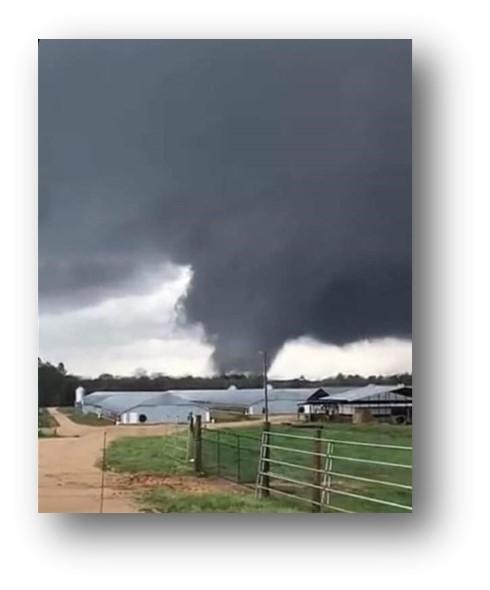

By Dr. Jonathan Moyle for The Mid-Atlantic Poultry Farmer
It is that time of year when we see the chance of tornados and heavy rains increasing and along with them the possibility of damaging winds and flooding. Additionally, hurricane season starts on June 1 and runs through Nov. 30.
Hurricanes also bring the potential for high winds, tornados, torrential rains, flooding, and tidal surges in coastal areas.
Regardless of the type of disaster, similar problems can occur to transportation and public utility services.
Therefore, it is important to prepare for emergencies before they happen to limit damage and lost production. In order to help prepare for natural disasters, consider the following items.
Gathering information is an easy place to start preparing for possible disaster situations. Begin by preparing a list of all important emergency contact numbers such as: local police and fire department, local emergency management office, hospital, physicians, schools, integrator, and flock supervisor, fuel supplier, propane supplier, equipment maintenance company, insurance company, Extension office, electric company, family and neighbors, etc.
Also, gather important materials such as: standard operating procedures, material safety data sheets for chemicals in use, maintenance manuals for equipment, financial information, insurance policy, etc.

Checklists can be helpful for remembering information during a stressful situation. It is always a good idea to keep a copy of this information along with your personal documents (such as prescriptions, passports, etc.) in a fire-resistant safe.
Caring for your family and then maintaining the health and welfare of your birds should be your top priority.
The basic needs of the birds depend on the generator functioning, allowing for feed and water to be available.
Normal feed deliveries may be disrupted, as deliveries will be dependent on feed availability and if roads are passable for delivery trucks. Companies will prioritize which farms get feed first, depending on needs and ability to deliver.
In extreme situations, it may be necessary to ration feed, feeding only enough for maintenance and reducing hours of light. If possible, be proactive and fill feed tanks prior to the arrival of a storm if one is forecast for your area.
Almost all-natural disasters result in some loss of electrical service. Bird welfare is dependent on electricity to power the ventilation system as well as provide feed and water. Generators need to be maintained so they are ready to run at all times and capable of supplying all the energy needs of your farm.
If you have recently added fans or other equipment to your farm, make sure the generator is sized big enough to supply the required increase in electrical load.
Some power outages can last for days, so consider how much fuel your generator uses when operating under a full load to determine the minimum size of the fuel tank needed. Always keep on hand sufficient fuel to run at least 24 hours, if not longer. Make sure your fuel supplier is capable of delivering fuel during natural disasters, and have a backup plan in case that supplier has a problem.
Other considerations are: do you have oil and oil filters to change the oil on the generator? Do you have backup air filters and other items needed to maintain the generator?
It is also recommended that you use fuel stabilizers to keep the fuel fresh, prevent oxidation, help clean out impurities, and protect your generator from corrosive condensation build-up.
Phone and internet service, both landlines and cellular, maybe out for some time. This will cause problems with your controller system contacting you when an alarm goes off, so extra care must be taken to prevent any production issues.
Communication should improve rapidly as conditions permit and you should stay tuned to weather forecasts and emergency broadcasts. Consider purchasing a weather radio tuned to National Oceanic and Atmospheric Administration broadcasts (www.noaa.gov).
Keep some cash on hand for emergency purchases.
If power and phone lines are down, stores may not be able to make credit card transactions and automatic teller machines may be out of service.
Again, safety should be a top priority, so do not enter collapsed or damaged buildings until their structural integrity can be verified.
Watch out for exposed electrical wires and make sure to shut off all electric and gas lines before going to inspect the damaged building.
Consult your integrator and/or Department of Agriculture and Department of Environment representative if you have chickens trapped inside a collapsed poultry house and/or may have birds that need to be euthanized.
Additionally, they will need to be notified if heavy rains have resulted in a manure discharge.
Biosecurity is still important, but not at the expense of safety. In severe weather, appropriate clothing and footwear take precedent. In all emergencies, personal safety and the safety of your family are top priority. To help keep your family safe, make sure you have an emergency supply of food and water (72 hours minimum, one month preferable). Having extra batteries on hand to operate flashlights, radios and other devices is an important part of preparing.
Make sure that your prescription medications are filled and if possible keep extra on hand. Consider ways you can purify water if your well becomes contaminated due to flooding.
Natural disasters and severe weather are going to happen, and being prepared can give you a little peace of mind during a stressful situation. Proper planning can help you get through the hard times and able to assist others as well.
This article appears in the July 2021 issue of the Commercial Poultry news and in the Mid-Atlantic Poultry Farmer.
Commercial Poultry Newsletter, July 2021
The Commercial Poultry News is a quarterly newsletter published by the University of Maryland Extension. To view, previous editions click here...